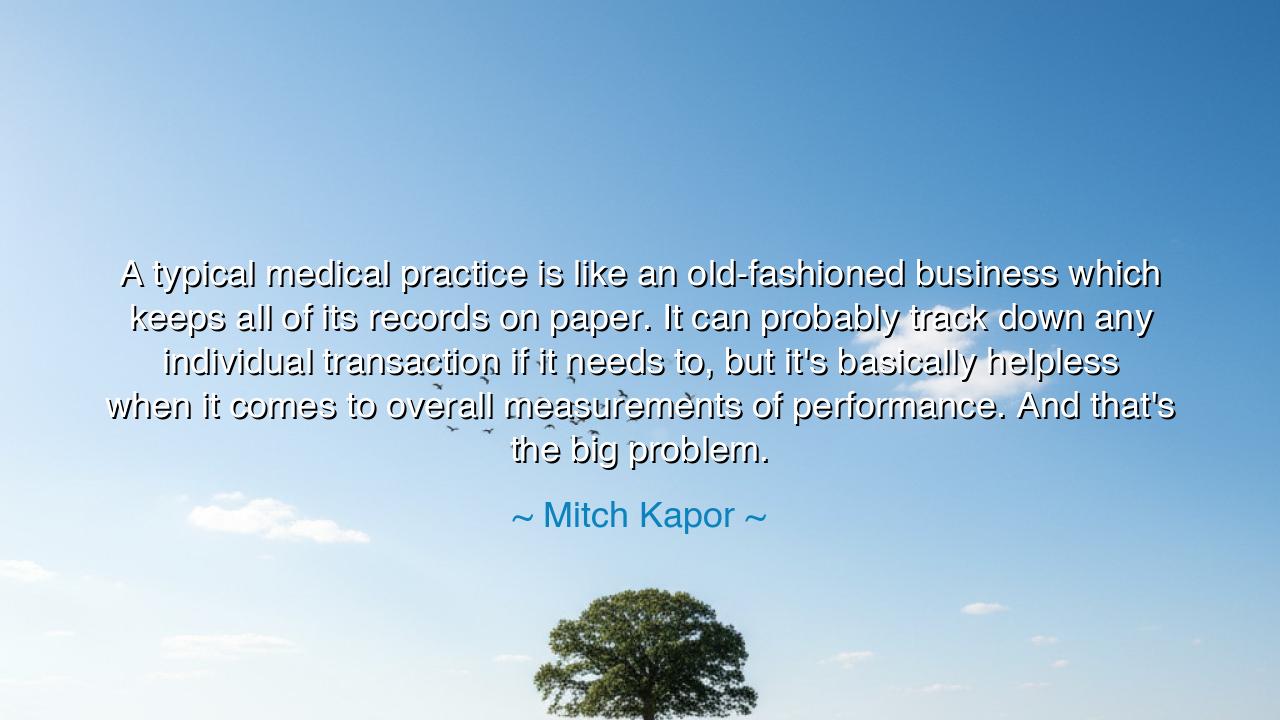
A typical medical practice is like an old-fashioned business
A typical medical practice is like an old-fashioned business which keeps all of its records on paper. It can probably track down any individual transaction if it needs to, but it's basically helpless when it comes to overall measurements of performance. And that's the big problem.






When Mitch Kapor declared, “A typical medical practice is like an old-fashioned business which keeps all of its records on paper. It can probably track down any individual transaction if it needs to, but it's basically helpless when it comes to overall measurements of performance. And that's the big problem,” he spoke with the clarity of one who has seen the limitations of tradition colliding with the demands of progress. His words carry the weight of wisdom: that knowledge, scattered and buried in paper, may serve in small moments but fails in the grand task of understanding, of measuring, of improving.
The first truth he names is the inadequacy of paper records. For centuries, paper carried the wisdom of physicians—notes, prescriptions, diagnoses scribbled in ink, stored in dusty files. On paper, one might retrieve a single story—a patient’s illness, a treatment, a bill. But paper cannot easily reveal the greater story: patterns of disease, the outcomes of treatments, the performance of a practice as a whole. It is like looking at individual stars without ever seeing the constellations they form. Kapor reminds us that medicine, bound in paper, becomes fragmented, unable to rise above detail into vision.
This problem is not unique to medicine. The ancients too struggled with the burden of information without clarity. In the Library of Alexandria, scrolls held the wisdom of civilizations, but without proper organization and method, much of it was inaccessible. Knowledge existed, but it was inert, waiting for systems to unlock its power. In the same way, a medical practice might hold shelves of records, yet be blind to the patterns within them. To treat only individuals is noble, but to fail to see the larger picture—the health of communities, the effectiveness of treatments—is to miss the chance for deeper healing.
Kapor’s words point us toward the need for measurement of performance, the great mirror by which any system sees itself clearly. Without such measurement, mistakes repeat, inefficiencies persist, and progress stagnates. Imagine a captain steering a ship without charts, recording each wave but never mapping the voyage—he may recall a storm, but he will never know where he has been or where he is going. So it is with medicine bound in paper: it reacts but does not grow, heals one wound but fails to learn how to prevent another.
History gives us a sharp lesson in this. In the 19th century, before modern statistics, hospitals often did not measure outcomes systematically. Doctors clung to practices like bloodletting because they remembered individual cases that seemed successful, while ignoring the wider truth that many more patients died. It was only when pioneers like Florence Nightingale began to collect and analyze data—turning individual stories into patterns—that real progress was made. Nightingale’s charts revealed that unsanitary conditions killed soldiers more than battle itself, and her meticulous measurements transformed the future of medicine. This is precisely the power Kapor identifies: the leap from anecdote to analysis, from paper to knowledge.
The deeper meaning of his words is that tradition, though comforting, must give way to progress when lives are at stake. Paper records may hold the past, but they cannot guide the future. To truly honor patients, medicine must embrace systems that allow for insight, accountability, and growth. The big problem Kapor names is not only inefficiency, but the moral danger of ignorance—of failing to learn from patterns, of failing to see the larger truths hidden within the small.
For us, the lesson is profound: in every field of life, we must seek not only to remember individual events, but to discern the greater patterns. Do not live merely by reacting to each day; measure, reflect, and learn from the whole. In business, in health, in personal growth, seek systems that reveal truth beyond memory. Practical wisdom follows: embrace tools that allow for clarity, whether digital systems, regular reflections, or community accountability. Do not cling to the comfort of the old when the new can reveal truths that save lives.
Thus, Mitch Kapor’s words endure as a summons. Paper holds memory, but systems hold wisdom. Details save the moment, but patterns save the future. Let us honor the past, but not be bound by it. Let us carry forward medicine, and all human endeavor, into an age where knowledge is not scattered like leaves in the wind, but woven into patterns that guide us toward healing, growth, and the triumph of wisdom over ignorance.






AAdministratorAdministrator
Welcome, honored guests. Please leave a comment, we will respond soon